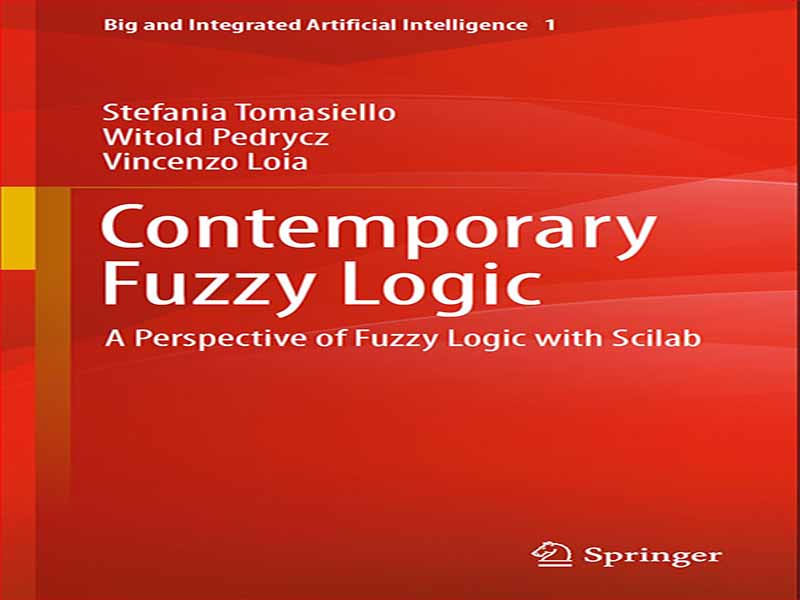- عنوان کتاب: Contemporary Fuzzy Logic
- نویسنده: Stefania Tomasiello, Witold Pedrycz
- حوزه: منطق فازی
- سال انتشار: 2022
- تعداد صفحه: 141
- زبان اصلی: انگلیسی
- نوع فایل: pdf
- حجم فایل: 4.02 مگابایت
نوشتن کتاب مانند سفری در تجارب گذشته است که ممکن است فرد بخواهد با خوانندگان بالقوه به اشتراک بگذارد. نویسنده ایتالیایی ایتالو کالوینو در «شش یادداشت برای هزاره بعدی»، کتابی از سخنرانیهای ارائهنشده که در دانشگاه هاروارد برنامهریزی شده است، ویژگیهای اساسی یک کتاب را مشخص میکند: سبکی، سرعت، دقت، دید، تعدد و ثبات. اگرچه این ویژگیها برای رمانها در نظر گرفته شده بود، اما معتقدیم که بیشتر آنها برای یک کتاب درسی علمی نیز کاربرد دارند. با چنین دیدگاهی، مایلیم ترکیبی از تحقیقات و تجربیات خود را از طریق دروسی که به دانشجویان مقطع کارشناسی ارشد و دانشجویان فارغ التحصیل رشته علوم کامپیوتر، ریاضیات، فیزیک و مهندسی ارائه کردهایم، به خوانندگان ارائه دهیم. بیش از نیم قرن از ظهور منطق فازی می گذرد، اما تحقیقات در این زمینه هنوز بسیار فعال است و کاربردهای زیادی در زمینه های مختلف جامعه مدرن ما دارد. همهگیری COVID-19 که زندگی همه را به هم ریخته است، همچنین تغییراتی را در عادات کاری ما ایجاد کرده است. بیش از هر زمان دیگری، به ویژه برای دانش آموزان، در دسترس بودن نرم افزار رایگان و منبع باز مهم بوده است. در این کتاب، خواننده با مفاهیم پایهای آشنا میشود که مفاهیم کلاسیک منطق فازی را تا مفاهیم پیشرفتهتر از تحقیقات پیشرفته کنونی در بر میگیرد. هر یک از موضوعات اصلی با مثال ها و کدهای Scilab همراه است. تا جایی که ما می دانیم، این اولین کتابی است که موضوعاتی را در منطق فازی با پشتیبانی از نرم افزارهای متن باز رایگان مانند Scilab ارائه می کند. اگرچه این کتاب ممکن است به عنوان کتاب درسی برای برخی دروس مورد استفاده قرار گیرد، ایده های کافی برای شروع پروژه های تحقیقاتی در منطق فازی وجود دارد. مایلیم از دانشآموزانمان تشکر کنیم که سؤالاتشان الهامبخش بسیاری از مثالها و مشکلات این کتاب بود. استفانیا توماسیللو کمک مالی صندوق اجتماعی اروپا از طریق برنامه آکادمی فناوری اطلاعات را تأیید می کند.
Writing a book is like a journey through past experiences that one may want to share with potential readers. The Italian writer Italo Calvino in “Six Memos for the Next Millennium”, a book of undelivered lectures scheduled at Harvard University, pinpoints the essential features of a book: lightness, quickness, exactitude, visibility, multiplicity, and consistency. Even though these features were meant for novels, we believe that most of them also apply to a scientific textbook. Armedwith such a vision, we wish to offer to the readers a synthesis of our research and experience through the courses we have delivered to upper-level undergraduate students and to graduate students majoring in computer science, mathematics, physics, and engineering. More than half a century has passed since fuzzy logic appeared, but the research in this area is still very active, with many applications in different fields of our modern society. The COVID-19 pandemic, which has upset everyone’s life, has also brought changes in our work habits. More than ever, especially for students, the availability of free and open-source software has been important. In this book, the reader is introduced to basic concepts that span the classical notions of fuzzy logic to more advanced notions from the current state-of-the-art research. Each of the major topics is accompanied with examples and Scilab codes. To the best of our knowledge, this is the first book presenting topics in fuzzy logic with the support of free open-source software, such as Scilab. Even though this book may be used as a textbook for some courses, there are sufficient ideas for starting research projects in fuzzy logic. We wish to thank our students, whose questions inspiredmany of this book’s examples and problems. Stefania Tomasiello acknowledges funding from the European Social Fund via the IT Academy programme.
این کتاب را میتوانید از لینک زیر بصورت رایگان دانلود کنید:
Download: Contemporary Fuzzy Logic



































نظرات کاربران